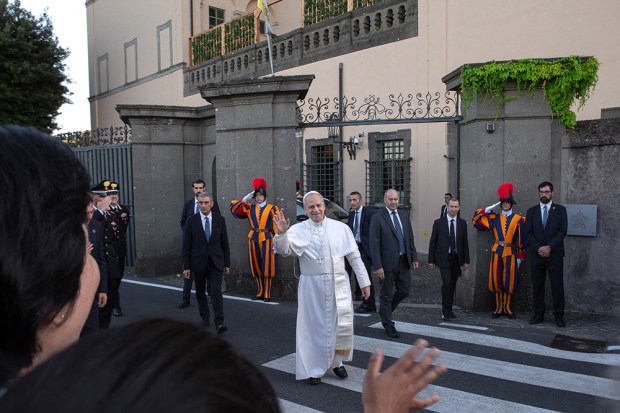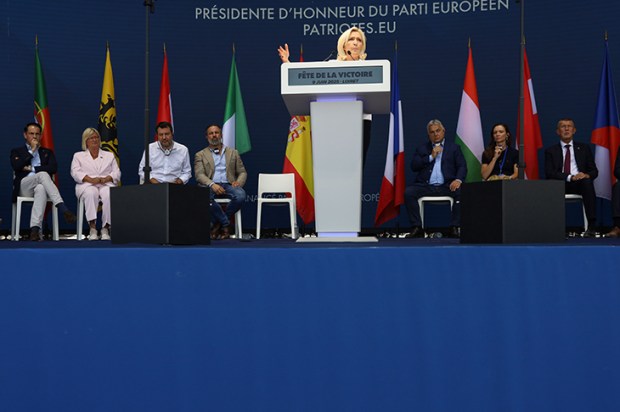Readers will recall the late Cardinal George Pell’s scathing Spectator Australia article, published a day after his passing, which spoke of the ‘toxic nightmare’ of Pope Francis’ Synod on Synodality, which reconvened for its final session in Rome last month.
Pell stated the Synod documents were ‘couched in neo-Marxist jargon’ and that the Synod itself was ‘largely irrelevant to the preaching of the gospel’.
In fact, the Synod on Synodality has been promoted as not focused on any one topic in particular – though numerous issues such as ‘female deacons’ and LGBT ‘inclusion’ continue to be raised by individual members. Rather, it presents a new manner of ecclesial life and governance, one in which endless questioning, round-table discussions, and joint decision-making become the norm while the traditional hierarchy and unchanging teachings of the Church are sidelined.
This Synod has been described as Francis’ end-game for the Church whereby ‘acts of synodality’ are ‘fine-tuning how the Gospel is applied to the signs of the times’.
In other words, the Church must ‘reinterpret’ God’s revelation in Scripture and Tradition in order to be compatible with current (but ever changing) secular views and standards, thus ignoring St Paul’s exhortation in 1 Corinthians iii 19 that the wisdom of this world is folly to God.
However, this can only lead to one thing – disunity in the Church. A divided Church is a weak Church, and a weak Church is manipulated by its enemies to weaken her further by allowing them to determine its beliefs and practices.
Two of the 368 Synod delegates are Bishops Vincent Zhan Silu and Joseph Yang Yongqiang from China.
As reported by George Wiegel in the Wall Street Journal, Silu and Yongqiang are at the forefront of efforts to ‘Sinicize’ Catholic communities, bringing them into conformity with ‘Xi Jinping Thought’ so as to ‘continue to follow a path that conforms to socialist society’.
As readers of this esteemed publication would be aware, in 2018 the Vatican signed a provisional agreement with the Chinese Communist party on the appointment of Catholic bishops. In doing so, the Vatican recognised the Chinese ‘Patriotic Church’, set up and controlled by the CCP as an arm of its United Front Work Department to undermine the underground Church that was loyal to the Vatican.
Cardinal Pell, in the Demos document attributed to him, wrote that ‘[D]ecisions and policies are often “politically correct”, but there have been grave failures to support human rights in Venezuela, Hong Kong and mainland China.’
He added that under the 2018 secret Vatican-China pact, there had been ‘no public support for the loyal Catholics in China who have been intermittently persecuted for their loyalty to the Papacy for more than 70 years’.
Although the pope has the final say in appointing bishops, the agreement gives Beijing a voice in their nomination – a clear violation of Canon Law which forbids civil authorities from having any role in appointing bishops.
Critics of the agreement warned that the Chinese would have no compunction in breaking it, and they have now done so, not once, but twice, as Kevin Andrews has written in these pages, announcing the appointment of bishops without consulting the Vatican.
As the German Bishop Athanasius Schneider stated in a recent interview, the ‘greatest enemy’ of the Soviet communists ‘was not so much the so-called Western World’, but the Catholic Church, and ‘especially the Vatican’ because the popes ‘boldly resisted communism’ and condemned it.
Schneider described how his grandfather was killed as part of Joseph Stalin’s purge ‘simply because he was a Catholic’ and stated that the communists saw Christianity as an obstacle to their desired ‘atheist materialistic’ society.
Thus, since the Soviets saw the Vatican as ‘the greatest moral authority in the world’, its opposition to communism made the Catholic Church its ‘greatest enemy’.
This was embodied in Pope Saint John Paul II, whose resistance to and denunciation of communism, especially in his native Poland, from his election in 1978 led to the fall of the Berlin Wall.
His successor, Benedict XVI, also knew that communists could not be trusted.
In a letter to Chinese Catholics in 2007, Benedict declared that communism’s purposes are ‘incompatible with Catholic doctrine’.
No such moral fortitude, however, can be found in Pope Francis or his Secretary of State, Cardinal Pietro Parolin, who, as Wiegel asserts, seem to think that by kowtowing to China it would give Vatican diplomacy a place at the table in discussions about the world’s future with a potential global superpower.
The reality, though, is that the pursuit of this diplomatic fantasy has muted the Vatican’s voice on behalf of all persecuted believers in China. Note in particular Francis’ disgraceful silence at the jailing in Hong Kong of Jimmy Lai, a devout Catholic, and his dismissiveness of Cardinal Joseph Zen, emeritus bishop of Hong Kong.
Francis says he is ‘happy with the dialogue’, the results of which have been ‘good’. They are, in truth, a disgrace.
Thus, as the Demos document asserts, ‘The political influence of Pope Francis and the Vatican is negligible.’ Just as it was with the Pharisees, leaders who control have power, but no authority and the greater the control, the greater the resistance. Is it any wonder, then, that Demos described Francis’ papacy as ‘catastrophic’ and pointed out how Papa Bergoglio has little support among seminarians and young priests?
At this time, the words of probably the greatest American Catholic of the 20th century, Bishop Fulton J. Sheen, seem prophetic:
‘Who is going to save our Church? Not our bishops, not our priests and religious. It is up to you, the people. You have the minds, the eyes and ears to save the Church. Your mission is to see that your priests act like priests, your bishops act like bishops, and your religious act like religious.’
Young Catholics are heeding these words. Francis has called for the Church to ‘listen’ to youth and they have spoken. The Synod’s X account shows they are calling for a return to a Christ-centred Church of orthodoxy and tradition, not a ‘synodal church’ that adapts to the world and does shady deals with its enemies.
Got something to add? Join the discussion and comment below.
You might disagree with half of it, but you’ll enjoy reading all of it. Try your first month for free, then just $2 a week for the remainder of your first year.












